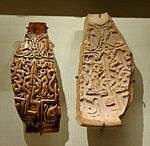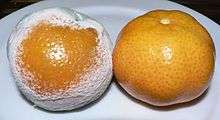Definify.com
Webster 1913 Edition
Mold
Webster 1828 Edition
Mold
MOLD
,MOLD
, n.MOLD
,MOLD
,MOLD
,Definition 2026
mold
mold
English

Alternative forms
- mould (Commonwealth spelling)
Noun
mold (plural molds)
- A hollow form or matrix for shaping a fluid or plastic substance.
- A frame or model around or on which something is formed or shaped.
- Something that is made in or shaped on a mold.
- The shape or pattern of a mold.
- General shape or form.
- the oval mold of her face
- Alexander Pope (1688-1744)
- Crowned with an architrave of antique mould.
- 1915, Emerson Hough, The Purchase Price, chapterI:
- This new-comer was a man who in any company would have seemed striking. […] Indeed, all his features were in large mold, like the man himself, as though he had come from a day when skin garments made the proper garb of men.
- Distinctive character or type.
- a leader in the mold of her predecessors
- A fixed or restrictive pattern or form.
- His method of scientific investigation broke the mold and led to a new discovery.
- (architecture) A group of moldings.
- the arch mold of a porch or doorway; the pier mold of a Gothic pier, meaning the whole profile, section, or combination of parts
- (anatomy) A fontanelle.
Derived terms
- break the mold
- (archaeology): post mold
- (paleontology): fossil mold
Translations
Verb
mold (third-person singular simple present molds, present participle molding, simple past and past participle molded)
- (transitive) To shape in or on a mold.
- (transitive) To form into a particular shape; to give shape to.
- Job 10:8-9, Old Testament, New International Version:
- Your hands shaped me and made me....Remember that you molded me like clay.
- Job 10:8-9, Old Testament, New International Version:
- (transitive) To guide or determine the growth or development of; influence; as, a teacher who helps to mold the minds of his students
- (transitive) To fit closely by following the contours of.
- (transitive) To make a mold of or from (molten metal, for example) before casting.
- (transitive) To ornament with moldings.
- (intransitive) To be shaped in or as if in a mold.
- These shoes gradually molded to my feet.
Translations
|
Etymology 2

From Middle English mowlde, noun use and alteration of mowled, past participle of moulen, mawlen (“to grow moldy”), from Old Norse mygla (compare dialectal Danish mugle), from Proto-Germanic *muglōną, diminutive and denominative of *mukiz 'soft substance' (compare Old Norse myki, mykr (“cow dung”)), from Proto-Indo-European *meuk- 'slick, soft'. More at muck and meek.
Noun
mold (plural molds)
- A natural substance in the form of a woolly or furry growth of tiny fungi that appears when organic material lies for a long time exposed to (usually warm and moist) air.
Derived terms
See also
Translations
|
|
Verb
mold (third-person singular simple present molds, present participle molding, simple past and past participle molded)
- (transitive) To cause to become moldy; to cause mold to grow upon.
- (intransitive) To become moldy; to be covered or filled, in whole or in part, with a mold.
Etymology 3
From Old English molde, from Proto-Germanic *muldō ‘dirt, soil’ (compare Old Frisian molde, Middle Dutch moude, Dutch moude, obsolete German Molte, Norwegian mold), from Proto-Indo-European *ml̥-tā (compare Old Irish moll ‘bran’, Lithuanian mìltai ‘flour’), from *mel- (compare English meal). More at meal.
Noun
mold (plural molds)
Derived terms
Translations
Verb
mold (third-person singular simple present molds, present participle molding, simple past and past participle molded)
- To cover with mold or soil.
Faroese
Etymology
From Old Norse mold, from Proto-Germanic *muldō ‘dirt, soil’ from Proto-Indo-European *ml̥-tā, from *mel-.
Pronunciation
- IPA(key): [mɔlt]
Noun
mold f (genitive singular moldar, uncountable)
- (agriculture) earth, humus soil, humus layer
Declension
| Declension of mold (singular only) | ||
|---|---|---|
| f2s | singular | |
| indefinite | definite | |
| nominative | mold | moldin |
| accusative | mold | moldina |
| dative | mold | moldini |
| genitive | moldar | moldarinnar |
Icelandic
Etymology
From Old Norse mold, from Proto-Germanic *muldō (“dirt, soil”).
Noun
mold f (genitive singular moldar, nominative plural moldir)
Declension
Old Norse
Etymology
From Proto-Germanic *muldō (“dirt, soil”). Cognate with Old English molde (English mold), Old High German molta, Gothic 𐌼𐌿𐌻𐌳𐌰 (mulda).
Pronunciation
- (12th century Icelandic) IPA(key): /mold/
Noun
mold f (genitive moldar, plural moldir)
- earth, dirt, soil
- Vǫluspá, stanza 3, lines 7–8:
- mjǫtvið mœran
- fyr mold neðan.
- the great tree
- beneath the ground.
- Vǫluspá, stanza 3, lines 7–8:
Declension
Descendants
References
- mold in Geir T. Zoëga (1910) A Concise Dictionary of Old Icelandic, Oxford: Clarendon Press